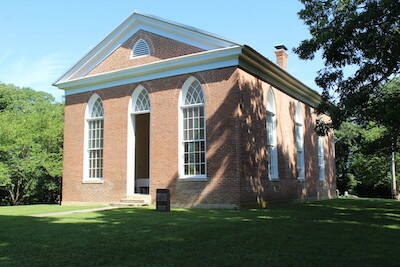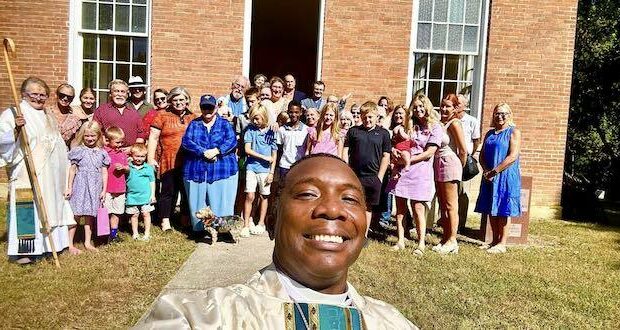Missouri is home to several historic Episcopal churches, and some of them are starting to show their age. “The biggest challenge facing most of our congregations, both now and in the future, is going to be the buildings,” Bishop Deon Johnson told Episcopal News Service.
Some of the oldest church buildings in the state include the rural St. John’s Episcopal Church outside of Eolia, an hour north of St. Louis. This beautiful little church built in 1856 is the oldest Episcopal church building in the Diocese of Missouri and is on the National Register of Historic Places.

St. John’s Episcopal Church in Eolia is the oldest in the Missouri Diocese. Photo: Diocese of Missouri.
Historic buildings in the Diocese of Western Missouri include Boonville’s Christ Church built in the early 1840s, according to Rev. Chandler Jackson, archivist for the Diocese of Western Missouri.
Jackson told Metro Voice that other historic buildings include one in Fayette built just after Booneville’s and Christ Episcopal Church in Springfield, built in 1870 with later additions.
In Kansas City, the oldest Episcopal building still in use in the Diocese is St. Mary’s Episcopal Church, located at 13th and Holmes. This impressive neo-gothic structure was begun in the 1870s and completed in 1887.
“The earliest churches were built along the rivers,” Rev. Jackson says. “My theory is that they were started by settlers from Virginia and the south who migrated west.”
That was a long time ago.
This is why in fall 2021 he called for “basement to belfry” inspections. The Diocese of Missouri, which covers the eastern half of the state, has spent the past two years conducting comprehensive property inspections at all 41 of its churches. These inspections enable the diocese to prioritize and coordinate financial support of congregations as they plan for renovations and repairs. “What could be fixed now that would save us expenditure of time and money down the road?” Johnson asked.
The team is led by Rick Kuhn, who owns Kuhn Construction and is a parishioner at Emmanuel Episcopal Church in Webster Groves. It is part of his “lifelong passion” to share his team’s expertise with the diocese’s congregations. “The knowledge that we bring back, I think, is immeasurable,” he said.
His inspectors check ceilings for water damage and then search for the cause of the damage. They look for broken steps, loose handrails and uneven ground that could cause people to fall. They inspect tuckpointing and flashing, roofs and gutters. They detect any lead and mold that might need remediation. And they inventory furnaces, boilers and other appliances and estimate how much life they have left before needing replacement.
Faith communities are more than the buildings where they worship, Johnson said, but he doesn’t discount the spiritual and emotional resonance of the church as a shared physical gathering place. “It’s the place where people come to be baptized, to be buried, to be married and reaffirm their faith,” he said. “While we don’t worship the building, the building is often the container for those sacred moments of people’s lives.”
–Dwight Widaman | Metro Voice
 Metro Voice News Celebrating Faith, Family & Community
Metro Voice News Celebrating Faith, Family & Community









